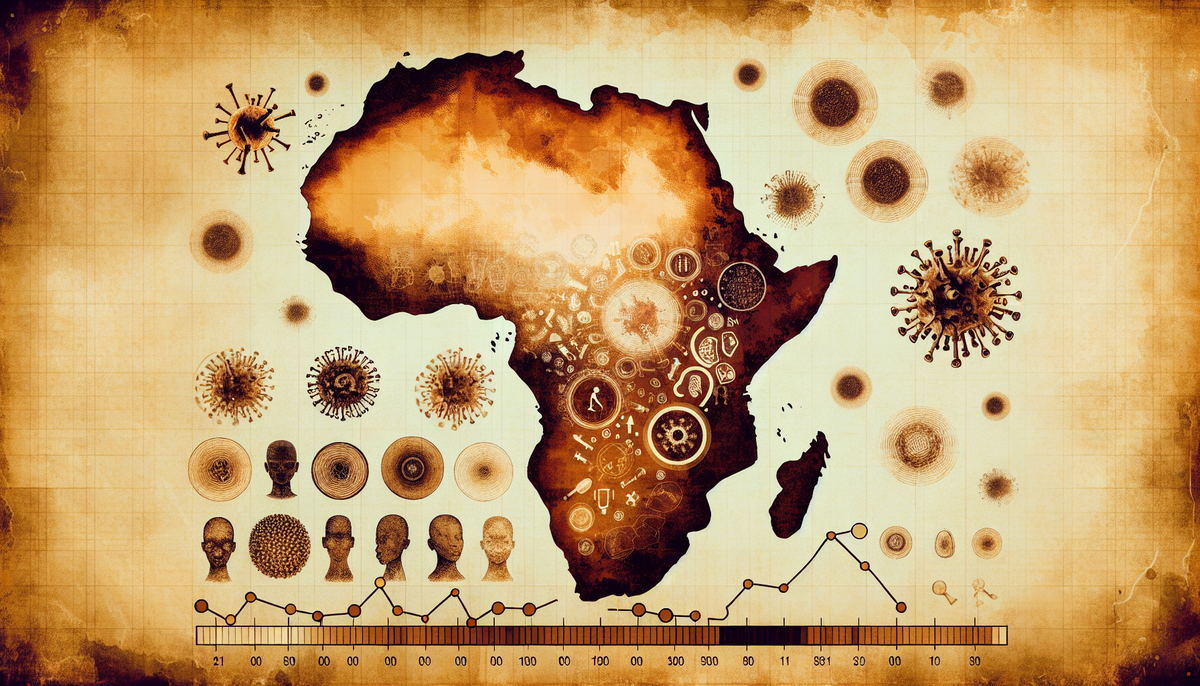The Historical Impact of Pandemic Diseases on African Populations

Introduction to Pandemic Diseases and African History
Pandemic diseases have played a significant role in shaping the course of African history, impacting societies in multifaceted ways. From the early days of human civilization to present times, the continent has faced numerous outbreaks that have altered demographic, social, and economic landscapes. The intersections of health crises with colonialism, trade, and globalization have often exacerbated the effects of these diseases, leading to profound consequences for communities.
Africa’s diversity in cultures, languages, and traditions has also influenced how populations respond to health threats. Traditional healing practices, societal structures, and government responses have all played roles in mitigating or amplifying the effects of pandemics. Various diseases, including smallpox, HIV/AIDS, and Ebola, have not only strained public health systems but have also led to significant loss of life, stigmatisation, and long-term socio-economic challenges.
Understanding the historical impact of these pandemics is crucial, as it provides insights into current health challenges and cultivates awareness of the importance of preparedness and resilience. By examining the lessons learned from past experiences, African nations can better navigate future epidemics while fostering a more equitable approach to global health crises.
Variola Virus and the Smallpox Epidemics
The variola virus, responsible for smallpox, has been a devastating force in human history, and its impact on African populations cannot be understated. Smallpox was prevalent across the continent long before the advent of modern medicine, causing significant mortality and morbidity. The disease, characterized by fever, body aches, and a distinctive rash, had an especially high fatality rate among infants and young children, devastating families and communities.
During the 18th and 19th centuries, smallpox outbreaks were rampant, often intensified by colonial trade routes and military campaigns. The introduction of variola into indigenous populations, who had no prior exposure, resulted in catastrophic effects, leading to demographic shifts and contributing to the destabilization of societies. The colonial powers often exploited these health crises, further marginalizing local populations while failing to provide adequate support for their healthcare needs.
The introduction of vaccination in the late 19th century marked a turning point in the fight against smallpox. However, access to this life-saving intervention was frequently unequal, with rural and less privileged communities facing barriers. The legacy of smallpox in Africa highlights how infectious diseases can shape societal structures, revealing the urgent need for effective public health strategies to protect vulnerable populations.
HIV/AIDS Emergence and Its Extensive Toll
The emergence of HIV/AIDS in the late 20th century marked a catastrophic turning point for African populations, representing one of the most severe public health crises in the continent's history. Initially identified in the early 1980s, the virus quickly spread, driven by factors such as high levels of sexual transmission, drug use, and inadequate healthcare infrastructure. Sub-Saharan Africa has borne the brunt of this epidemic, with millions of lives affected.
The toll of HIV/AIDS extends beyond the disease itself; it has disrupted families, economies, and societal structures. In many African nations, the illness has disproportionately impacted young adults, leading to a generation of caregivers and breadwinners lost, which has had cascading effects on communities. Orphans left behind often face poverty and lack of educational opportunities, perpetuating cycles of disadvantage.
Furthermore, the stigma associated with HIV/AIDS has often hindered prevention efforts and treatment uptake. Misconceptions regarding transmission and social perceptions of those living with the virus have contributed to discrimination, making it challenging for individuals to seek help. While advancements in antiretroviral therapy have improved life expectancy and quality of life for many, the ongoing need for education, advocacy, and support illustrates how deeply intertwined health crises are with social and economic realities in Africa.
Development and Spread of Tuberculosis
Tuberculosis (TB) has a long and intricate history in Africa, emerging as one of the continent's most persistent health challenges. Caused by the bacterium Mycobacterium tuberculosis, TB has been a significant cause of morbidity and mortality for centuries, exacerbated by various social and environmental factors. The disease primarily spreads through airborne particles, making densely populated urban areas and underserved communities particularly vulnerable.
The colonial period intensified the disease's impact, as urbanization and migration patterns disrupted traditional living conditions and facilitated the spread of TB. Poor living conditions, inadequate healthcare access, and malnutrition have all contributed to the endemic nature of TB in many African regions. Compounding the crisis is the HIV/AIDS epidemic, which has dramatically increased susceptibility to tuberculosis infections due to weakened immune systems.
Despite being a preventable and treatable disease, TB remains a leading cause of death in Africa, with drug-resistant strains posing additional challenges. Efforts to combat TB have included initiatives for early detection, treatment, and vaccination; however, inadequate resources and health infrastructure often limit the effectiveness of these interventions. Addressing TB requires comprehensive strategies that encompass healthcare access, community education, and socio-economic support to create a sustainable impact on public health across the continent.
Economic and Social Effects of Malaria
Malaria remains a pervasive health threat in many African nations, profoundly affecting both the economy and social fabric of communities. Spread by the Anopheles mosquito, the disease causes considerable illness and mortality, primarily among children and pregnant women. The cyclical nature of malaria transmission creates a heavy burden on public health systems, diverting resources and efforts from other essential services.
Economically, malaria significantly impedes productivity. Employees suffering from the disease are often unable to work, leading to lost wages and decreased workplace efficiency. Agricultural sectors are particularly hard-hit, as malaria can reduce labor availability during crucial planting and harvesting seasons, threatening food security. The costs associated with malaria treatment and prevention further strain household finances and government budgets, leading to long-term economic stagnation.
Socially, malaria impacts community dynamics, as families may experience repeated illness and loss, perpetuating cycles of poverty and despair. Stigma surrounding the disease can hinder individuals from seeking timely treatment, impacting community cohesion. Additionally, reduced productivity and illness contribute to an overall decline in educational outcomes, as children miss school due to sickness. To address these multifaceted challenges, comprehensive malaria control strategies must target health, education, and economic development to foster resilient communities across Africa.
Ebola Virus Outbreaks and Responses
Ebola virus outbreaks have profoundly impacted West Africa, creating serious public health emergencies with far-reaching social and economic consequences. First identified in 1976, the virus gained global attention during the most severe outbreak from 2014 to 2016, when it infected over 28,000 people and resulted in more than 11,000 deaths primarily in Guinea, Liberia, and Sierra Leone. The outbreaks highlighted the vulnerabilities in healthcare systems, as local resources were quickly overwhelmed by the surge of infections.
Rapid responses to Ebola outbreaks have evolved, focusing on containment strategies such as contact tracing, quarantine, and community engagement. These approaches aimed to limit transmission and curb the spread of the virus. The development and deployment of effective vaccines further transformed outbreak management, marking a significant advancement in public health responses.
However, the stigma associated with the disease complicated efforts, as fear and misinformation often led to resistance against public health interventions. The economic fallout was considerable, as the crisis disrupted trade, agriculture, and everyday life. Ultimately, the response to Ebola necessitated a multidisciplinary approach, emphasizing the importance of strengthening healthcare infrastructure, effective communication, and community collaboration to mitigate the impact of future outbreaks in Africa and beyond.
COVID-19 Pandemic Challenges in African Regions
The COVID-19 pandemic has posed unprecedented challenges for African regions, exacerbating existing vulnerabilities in healthcare systems, economies, and social structures. As the virus spread globally in early 2020, African countries faced multiple obstacles, including limited healthcare infrastructure, shortages of medical supplies, and a lack of testing capabilities. Many healthcare facilities were ill-equipped to handle a surge in cases, resulting in increased morbidity and mortality.
The economic impact has been profound, with lockdowns and restrictions leading to significant job losses, particularly in sectors reliant on informal labor. Small businesses faced closures, and food security became a pressing concern as supply chains were disrupted. The pandemic also highlighted disparities in access to healthcare, with rural areas and marginalized communities disproportionately affected.
Socially, the mental health toll has been severe, as isolation, fear, and uncertainty took their toll on individuals and families. Educational institutions faced prolonged closures, impacting millions of students and widening the educational gap.
Efforts to combat COVID-19 included vaccine deployment, utilizing international partnerships, and public health campaigns to promote awareness. However, vaccine hesitancy and inadequate distribution continue to challenge recovery efforts. Addressing these multifaceted issues requires a coordinated response to build resilience and enhance future healthcare preparedness across the continent.



